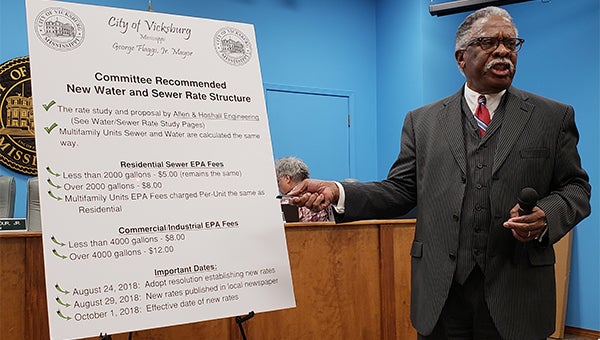Flaggs holds public forum on utility rates
Published 7:05 pm Friday, April 20, 2018
Mayor George Flaggs Jr. took his case for increasing water and sewer rates to the public Thursday night.
The meeting, which was attended by about 25 people, was expected to last an hour, but ran two hours as Flaggs outlined the proposed rate structure recommended by a 10-member committee appointed to examine the city’s rate structure and explained the difference between the city’s general fund and utilities budgets.
Flaggs said the proposed new rates, if approved, will go into effect Oct. 1.
“You don’t assess (rate increases) during the summer months, because the summer is when you use the most water,” he said.
“(Aldermen) Mike Mayfield and Alex Monsour haven’t seen this (the rate structure) yet,” Flaggs told the residents. “This rate structure was recommended by the committee. They didn’t want to do this.”
Under the new rate structure, the minimum rate a customer would pay is set on a sliding scale based on the size of the water meter and water use.
The least a residential customer will pay under the new schedule is $10.06 for the first 2,000 gallons, an increase of $1.31 more than the $8.75 minimum rate users have paid since the rates were raised in 2015. Commercial and industrial users would pay a minimum of $41.18 for the first 4,000 gallons used, a $5.37 increase from the present rate of $35.81.
The minimum residential sewer rate was increased by $3.20, from $12.90 to $16.10 for the first 2,000 gallons, and from $3.96 to $4.96 per 1,000 gallons for the second 2,000 gallons — a $1 increase.
The new minimum commercial rate is $43.31 for the first 2,000 gallons, an increase of $15.06 over the present rate of $28.25, and $4.96 per 1,000 gallons for the second 2,000, an increase of $1 over the present $3.96. The industrial sewer rate is unchanged at $446 for the first 200,000 gallons.
He said the Board of Mayor and Aldermen will vote on the new rate structure in August, “So you’ve got between now and then to convince Mike Mayfield and Alex Monsour not to vote for it.”
Flaggs said the city’s general fund budget, which funds city government is funded by property and sales taxes, while utilities are funded by fees for service.
Utility costs and fees are separate from the general fund.
Discussing the city ‘s utilities, Flaggs said the city’s utilities infrastructure is more than 100 years old.
“In the last five years, it is costing us more to provide water and sewer than we collect,” he said, adding the city is in the process of upgrading the electrical system at the water treatment plant, and is in the process of preparing to install an auxiliary water line.
He said the city needs to find matching funds for the project, which is funded in part by a $2.7 million U.S. Army Corps of Engineers 592 grant. “It’s ready to go, we just have to have the money in bank,” he said.
The rate structure was questioned by the Rev. Arthur Barrera, who said in the five years he has lived in the city, has seen his water, sewer and trash fees go from $53 to almost $100.
Barrera suggested Flaggs examine other ways to save.
“I don’t feel the city has done everything it can to scratch the cost of everything,” he said. He said some neighbors told him people were using water illegally, adding city utilities workers were not locking the meters when they turn them off.
“I’m saying there are costs that aren’t being scrutinized — employees, vehicles,” he said.
Flaggs offered to check Barrera’s utilities costs. He said the city has cross-trained employees and outfitted all city vehicles except his and Police Chief Milton Moore’s with GPS.
Water and gas supervisor Dane Lovell said the city’s new meter system tells officials if someone is illegally using water.
Flaggs reminded the residents the rates were proposed rates, adding, there may be room for compromise.
“I do think we can work with these numbers,” he said. “Show me a better way, and I’ll listen.”







